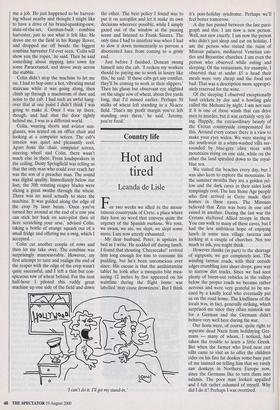Country life
Hot and tired
Leanda de Lisle
For two weeks we idled in the moun- tainous countryside of Crete, a place where they have no word that conveys quite the urgency of the Spanish manana. We rose, we swam, we ate, we slept, we slept some more. I am now utterly exhausted.
My dear husband, Peter, is upstairs in bed as I write. He nodded off during lunch. I found that shouting 'Cheesecake!' revived him long enough for him to consume his pudding, but he's been unconscious ever since. His excuse is that the antihistamine tablet he took after a mosquito bite mea- suring 12 inches by five appeared on his waistline during the flight home was labelled 'may cause drowsiness'. But I think I can't do it. I'll get my stand-in.' it's post-holiday syndrome. Perhaps we'll feel better tomorrow.
A day has passed between the last para- graph and this. I am now a new person. Well, not new exactly. I am now the person who didn't just sleep and eat on holiday. I am the person who visited the ruins of Minoan palaces, mediaeval Venetian cas- tles and Byzantine churches. I am even the person who observed while eating and sleeping. Of the restaurants, for example, I observed that at under £5 a head their meals were very cheap and the food not bad. That was a description more appropri- ately reserved for the wine.
Of the sleeping I observed exceptionally loud crickets by day and a howling gale called the Meltemi by night. I am not sure if it is one of those winds that can drive men to murder, but it was certainly very tir- ing. Happily, the extraordinary beauty of the Cretan countryside compensated for this. Around every corner there is a view to make your eyes widen. We were staying in the south-west in a white-washed villa sur- rounded by blue-grey olive trees with mountains rising on one side, while on the other the land spiralled down to the royal- blue sea.
We visited the beaches every day, but I was also keen to explore the mountains. In the summer months they are a golden yel- low and the dark caves in their sides look temptingly cool. The late Stone Age people who first arrived in Crete made their homes in these caves. The Minoans believed that Zeus was born in one and raised in another. During the last war the Cretans sheltered Allied troops in them. You can walk to many of these caves, but I had the less ambitious hope of enjoying lunch in some nice village taverna and looking at a couple of churches. Not too much to ask, you might think.
However thanks (in part) to the shortage of signposts, we got completely lost. The winding tarmac roads, with their outside edges crumbling into sheer drops, gave way to narrow dirt tracks. Since we had seen plenty of burnt-out vehicles in the valleys below the proper roads we became rather nervous and were very grateful to be res- cued by a kindly local who eventually put us on the road home. The kindliness of the locals was, in fact, generally striking, which surprised me since they often mistook me for a German and the Germans didn't behave very well here during the war.
Our hosts were, of course, quite right to separate dead Nazis from holidaying Ger- mans — many of whom, I noticed, had taken the trouble to learn a little Greek. But when the farmer who lived near our villa came to visit us to offer the children rides on his fine fat donkey some base part of me insisted on telling him that we rarely saw donkeys in Northern Europe now, since the Germans like to turn them into salamis. The poor man looked appalled and I felt rather ashamed of myself. Why did I do it? Perhaps I was overtired.


























































 Previous page
Previous page